Colonel Walker Melville "Bud" Mahurin (December 5, 1918 – May 11, 2010) was a retired officer of the United States Air Force (USAF). During World War II, while serving in the United States Army Air Forces (USAAF), he was a notable flying ace. was a retired officer of the United States Air Force (USAF). During World War II, while serving in the United States Army Air Forces (USAAF), he was a notable flying ace. Bud Mahurin was the first American pilot to become a double ace in the European Theater and the only ace to shoot down enemy planes in both the European and Pacific Theaters and the Korean War. During World War II he was credited with 20.75 aerial victories, making him the sixth-highest American P-47 ace. He was credited with shooting down 3.5 MiG-15s in Korea, giving him a total of 24.25 aircraft destroyed in aerial combat.
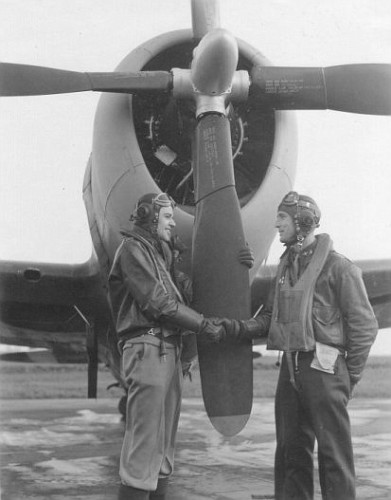 Born in Benton Harbor, Michigan, Mahurin joined the U.S. Army Air Forces as an aviation cadet on September 29, 1941 after several years as an engineering student at Purdue University. Graduating from pilot training on April 29, 1942, he was subsequently assigned to the 63d Fighter Squadron, 56th Fighter Group and deployed to England with the group in January 1943. Based at Halesworth, England, Captain Mahurin became a flight leader in the 63rd FS and began flying missions in May. Born in Benton Harbor, Michigan, Mahurin joined the U.S. Army Air Forces as an aviation cadet on September 29, 1941 after several years as an engineering student at Purdue University. Graduating from pilot training on April 29, 1942, he was subsequently assigned to the 63d Fighter Squadron, 56th Fighter Group and deployed to England with the group in January 1943. Based at Halesworth, England, Captain Mahurin became a flight leader in the 63rd FS and began flying missions in May. On August 17, 1943, he scored his first two aerial victories by shooting down a pair of German Focke-Wulf Fw 190s while escorting 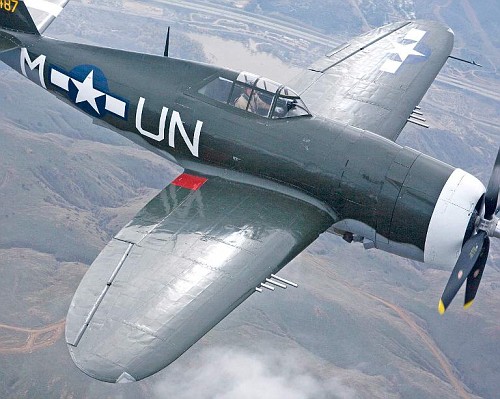 B-17 bombers as part of the Schweinfurt-Regensburg mission. One of these fighters was flown by Major Wilhelm "Wutz" Galland, Gruppenkommandeur of II/JG 26, and an ace with some 55 claims to his credit. He became an ace on October 4 after shooting down three Messerschmitt Bf110s. On November 26, Mahurin shot down three more Bf-110s to become the first American pilot in the European Theater of Operations to score 10 aerial victories. His primary aircraft, P-47D-5-RE B-17 bombers as part of the Schweinfurt-Regensburg mission. One of these fighters was flown by Major Wilhelm "Wutz" Galland, Gruppenkommandeur of II/JG 26, and an ace with some 55 claims to his credit. He became an ace on October 4 after shooting down three Messerschmitt Bf110s. On November 26, Mahurin shot down three more Bf-110s to become the first American pilot in the European Theater of Operations to score 10 aerial victories. His primary aircraft, P-47D-5-RE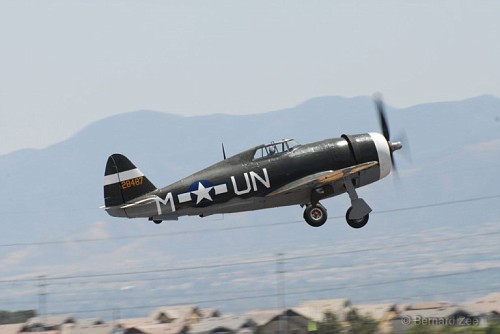 42-8487, bore the squadron codes UN:M and was nicknamed The Spirit of Atlantic City, N.J. 42-8487, bore the squadron codes UN:M and was nicknamed The Spirit of Atlantic City, N.J. Mahurin was promoted to major on March 21, 1944, and on March 27, Major Mahurin's P-47 was heavily damaged by a German Dornier Do-217 bomber he helped shoot down, forcing him to bail out. He was picked up by French Resistance forces and, two months later, returned to England. Due to his knowledge of the French Resistance, he was grounded and sent home. In October, he again went overseas as commander of the 3rd Fighter Squadron, the combat element of the composite 3rd Air Commando Group in the Philippines. While based at Mangaldan, Luzon, in January 1945 he was credited with a kill of a Japanese bomber. Mahurin was promoted to lieutenant colonel on May 28, 1945 and became commander of the 3rd Air Commando Group in September 1945.
In 1950, at the start of the Korean War, Mahurin was serving in the Office 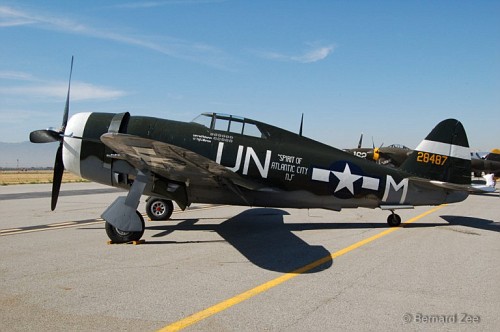 of the Secretary of the Air Force. In July 1951 he became commander of the 1st Fighter Group, training in the North American F-86 Sabre. In December he began a 90-day tour of temporary duty with the 51st Fighter-Interceptor Wing, serving as special assistant to the wing commander, Col. Francis S. Gabreski. Mahurin transferred to the 4th Fighter-Interceptor Wing on March 18, 1952, to command its 4th Fighter-Interceptor Group. On May 13, 1952, while strafing ground targets, his F-86 was shot down by North Korean of the Secretary of the Air Force. In July 1951 he became commander of the 1st Fighter Group, training in the North American F-86 Sabre. In December he began a 90-day tour of temporary duty with the 51st Fighter-Interceptor Wing, serving as special assistant to the wing commander, Col. Francis S. Gabreski. Mahurin transferred to the 4th Fighter-Interceptor Wing on March 18, 1952, to command its 4th Fighter-Interceptor Group. On May 13, 1952, while strafing ground targets, his F-86 was shot down by North Korean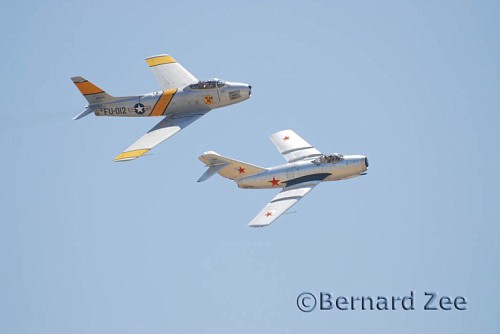 ground fire; after crash-landing, breaking his arm in the process, he was captured by enemy forces. ground fire; after crash-landing, breaking his arm in the process, he was captured by enemy forces. Mahurin spent 16 months in a North Korean prisoner of war (POW) camp. He endured torture that included intense questioning, solitary confinement, sleep deprivation, threats of execution, and brainwashing. While being questioned about false claims of the United States' use of biological warfare, he falsely admitted to dropping canisters of insects over North Korea. He was later released in September 1953, well after the war's end, and promoted to full Colonel. His experience in brainwashing techniques provided the U.S. with invaluable material to develop survival training courses. Nevertheless, he and other returning POWs were condemned by Senator Richard Russell, Jr. and others because of their false confessions.
In 1956, Mahurin retired from the U.S. Air Force to accept a senior position in the aviation industry. While the Air Force attributes this to his own choice, stating that he was low on the promotion list to permanent colonel and unlikely to make general, a pilot under his command in Korea, Robert Smith, asserts that the Air Force dishonored itself by pressuring Mahurin to resign from the service as a result of political infighting over the confessions, just four years short of becoming eligible for retirement benefits. |


































 h
h !!
!! Lamh Foistenach Abu!
Lamh Foistenach Abu!
 Lamh Foistenach Abu!
Lamh Foistenach Abu!